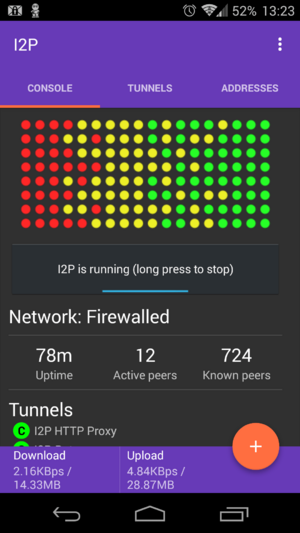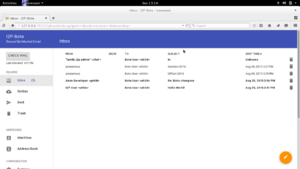I2P facts for kids
 |
|
| Original author(s) | I2P Team |
|---|---|
| Initial release | 2003 |
| Stable release | |
| Preview release |
Lua error in Module:Wd at line 1575: attempt to index field 'wikibase' (a nil value). / Error: first parameter is missing.
|
| Written in | Java |
| Operating system | Cross-platform: Unix-like (Android, Linux, BSD, macOS), Microsoft Windows |
| Available in | English, Spanish Incomplete translations: Russian, French, Romanian, German, Swedish, Italian, Portuguese, Chinese, Dutch, Polish, Hungarian, Arabic, Japanese, Estonian, Persian |
| Type | Anonymity application, Overlay network, mix network, garlic router, peer-to-peer |
| License | Public domain, BSD, GPL, MIT (license varies by component) |
The Invisible Internet Project (I2P) is like a secret online road that helps people communicate privately. It's a special network layer that lets you send messages and share files without others easily seeing what you're doing or who you are.
I2P works by encrypting, or scrambling, your messages. It then sends them through a network of about 55,000 computers around the world. These computers are run by volunteers. Because your messages take many different paths, it's very hard for anyone to watch your entire connection. The software that makes this happen is called an "I2P router." A computer running I2P is called an "I2P node." I2P is free and open-source, meaning anyone can use it and see how it works.
Contents
How I2P Works
I2P started in 2003. It was built from ideas that came from another project called Freenet.
I2P sends messages like postcards, but they are very secure. All your communication is encrypted four times over! This is like putting your message inside four locked boxes. It uses a method called garlic routing. Even the start and end points of your messages are secret codes. This means neither you nor the person you're talking to needs to show your real internet address to anyone else.
I2P is designed to let you use many regular internet services, but anonymously. This includes things like email, chat, file sharing, and even websites. It's a decentralized network, meaning no single company or person controls it. However, some studies have shown that it can be blocked in certain areas.
Many people who work on I2P use nicknames to protect their privacy. Some of the main developers are known as zzz, killyourtv, and Complication. Many other people also help make I2P better.
I2P uses strong encryption methods to keep your data safe. These include advanced codes like 2048bit ElGamal and AES256.
Updates and New Versions
I2P gets new stable versions every six to eight weeks. These updates are shared through I2P's own file-sharing system. They are also signed by the release manager to make sure they are real.
Over the years, I2P has had many updates to make it faster, safer, and easier to use. For example:
- In 2014, it added support for stronger digital signatures.
- In 2015, it improved how quickly it starts up and reduced delays in the network.
- In 2016, it got a big upgrade to its security features and improved how it works on Debian and Ubuntu computers.
- In 2018, a new, more secure way to send data called NTCP2 was added.
- In 2019, it improved how it finds other computers on the network and added a new setup guide for first-time users.
- In 2020, new types of encryption were added to make communication even more secure.
- In 2021, I2P continued to switch to a newer, faster encryption method called X25519.
- In 2022, a new transport method called SSU2 was enabled for all users, improving performance.
- In 2023, fixes were made to protect against certain types of attacks.
- In 2024, I2P added more ways to protect against attacks and stopped allowing I2P connections over Tor.
- In 2025, further bug fixes and network stability improvements were released.
How I2P Gets Money
The I2P website says that all its money comes from donations. However, the people who manage the project say that the main project itself doesn't take donations directly. Instead, they suggest donating to other applications that use I2P or to people who work on I2P. The Open Technology Fund has also helped I2P get started.
Unlike another privacy network called The Tor Project, I2P doesn't have the same financial setup to support "exit nodes." These are special computers that help connect users to the regular internet. The "reseed servers," which help new users join the I2P network, are run by volunteers.
Software and Tools
I2P is a network layer, which means other software can use it to communicate privately. Many tools are available or are being developed for I2P.
The main I2P software is controlled through a web page called the "router console." You can open this in your web browser.
General Network Tools
- I2PTunnel is a tool built into I2P. It lets regular internet programs send and receive data over I2P. It does this by setting up "tunnels" that connect to specific ports on your computer.
- SAM (Simple Anonymous Messaging) is a special language that lets any program talk over I2P.
- BOB (Basic Open Bridge) is a simpler version of SAM.
- As of July 2024, I2P no longer allows you to access its network if you are also using Tor.
Chat
- You can use many regular chat programs with I2P. You just need to connect them to the I2P chat server. I2P can even filter out commands that might reveal your identity.
- Some XMPP chat programs like Gajim or Pidgin can also work with I2P's XMPP servers.
File Sharing
- Several programs let you share files using BitTorrent over the I2P network. You can only connect to other I2P users for these files. I2PSnark is a BitTorrent program that comes with I2P. Vuze and BiglyBT are other popular BitTorrent programs that have I2P plugins.
- iMule and Nachtblitz are programs for sharing files using a different network called Kad. iMule is designed for anonymous file sharing and doesn't need central servers.
- I2Phex is a program for sharing files using the Gnutella network, adapted for I2P.
- MuWire is a file-sharing program that works on top of the I2P network.
Connecting to the Regular Internet
Vuze and BiglyBT are torrent programs that can connect I2P torrents to the regular internet (called the "clearnet") and vice versa. This means you can share files from the internet on I2P, and I2P users can download popular content from the internet while staying anonymous.
- I2P-Bote is a free and decentralized email system focused on security. It lets you have multiple email identities and keeps your email details private. It's still being developed but is quite useful. You can use it through the I2P web console or with regular email programs. All I2P-Bote emails are automatically encrypted and signed, so you don't need extra encryption software. It also adds delays to messages to make them harder to trace.
- I2P also has a free email service run by someone called Postman. Susimail is a web-based email program made for Postman's servers. It's designed to be secure and private and comes with the main I2P software.
Instant Messaging
- I2P-Messenger is a simple chat program for I2P. It doesn't use central servers, so no one can record your conversations. It's fully encrypted, meaning only you and the person you're chatting with can read your messages. You can use it to chat anonymously or securely with friends and family. It also lets you send files.
- I2P-Talk is another simple chat program for I2P with similar security features.
Publishing
- Syndie is an application for sharing content like blogs, news, and forums. It's built to be strong and keep working even if parts of the network go down. It can connect to I2P, Tor, and the regular internet.
- Aktie is a system for anonymous file sharing and online forums. It uses a "proof of work" system to help prevent spam.
Other I2P Software
- i2pd is a lighter version of the I2P router written in a different computer language (C++). It doesn't include all the extra applications like email or torrents, making it smaller.
- The Privacy Solutions project is a group that develops new I2P software to make it even more private and secure. They work on things like the Abscond browser bundle and the "BigBrother" network monitoring project.
Android Devices

- You can find an I2P Router app for Android phones on the Google Play store or from the developers' website.
- Nightweb was an Android app that used I2P to share blog posts and photos. It is no longer being developed.
Cryptocurrencies
Some digital currencies, called cryptocurrencies, can also use I2P for more private transactions. These include:
- Bitcoin
- Monero
- Verge
Important Words to Know
- ; Eepsite: These are websites that are hosted secretly within the I2P network. Their names usually end in .i2p, like ugha.i2p. You typically need I2P to visit these sites.
- ; .i2p: This is a special internet address ending that only works inside the I2P network. When you type an .i2p address, I2P helps your browser find the site without revealing your location.
- ; EepProxy: This program handles all the communication between your web browser and any eepsite. It acts like a middleman, making sure everything stays private.
- ; Peers, I2P nodes: These are other computers using I2P that are connected to your computer. All computers in the network help send and forward encrypted messages for each other.
- ; Tunnels: Every ten minutes, your computer makes a connection with another I2P computer. Your data, and data for other users, travels through these "tunnels" to reach its final destination.
- ; netDb: This is a special database that holds information about I2P computers and eepsites. It's spread out among many I2P routers. When you want to find an eepsite or more I2P computers, your I2P software asks this database.
Challenges and Improvements
Sometimes, websites hosted on I2P can be targeted by "denial of service" attacks. This is when too much fake traffic is sent to a website to make it crash. However, website owners can take steps to protect their sites.
In 2014, a security flaw was found in I2P that allowed some users to be identified. This flaw was quickly fixed.
A study in 2017 looked at how information from I2P software could be found on a seized computer. It showed that some unencrypted data might be present. The study also mentioned that some countries try to block I2P using different methods, like blocking certain internet addresses.
I2PCon
In August 2015, the first I2P convention, called I2PCon, was held in Toronto, Canada. It was hosted by a local hackerspace. The conference included talks from I2P developers and security experts.
More to Explore
- Crypto-anarchism
- Deep web
- Darknet
- Garlic routing
- Key-based routing
- Public-key cryptography
- Rendezvous protocol
- Secure communication
- Threat model
Related Software
- Freenet
- Mixnet
- Retroshare
- Tor
- Tribler
- ZeroNet
See also
 In Spanish: I2P para niños
In Spanish: I2P para niños




